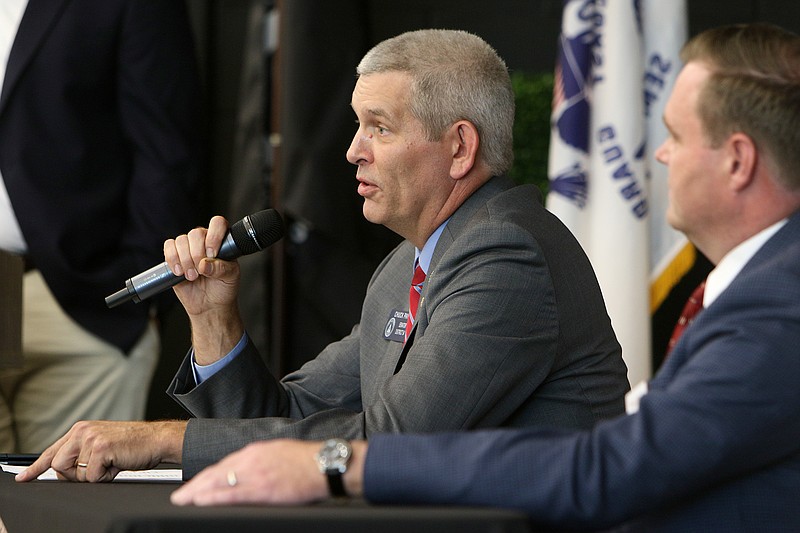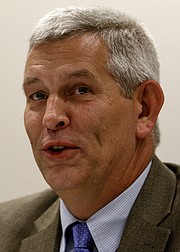For the second year in a row, Georgia lawmakers will try to ease Dalton Utilities' path to big loans, helping the company cover its costs for the Plant Vogtle nuclear project if funds run dry.
State Sen. Chuck Payne, R-Dalton, filed a bill Wednesday that would lift restrictions on municipal-owned utilities. Currently, those groups can't issue revenue bonds for electric transmission assets without approval from the city's voters on a referendum. Payne's bill does away with the referendum requirement.
Instead, only the utility board, the city council and a local Superior Court judge would need to approve the plan for a bond. Payne told the Times Free Press the bill helps Dalton Utilities grow.
"In the long run," he said, "this is good for Dalton citizens. It turns it back to local control. The mayor and city council can make decisions that they need to make, as far as issuing revenue bonds for growth and need."
Payne said Dalton Utilities executives have wanted this flexibility for several years, but "the powers that be" have held them back. He declined to name those forces. But since last year, Dalton Utilities has received help from one of the strongest allies in the capitol: Georgia Power.
Dalton Utilities and Georgia Power are tied together through Plant Vogtle, which has drawn criticism because the price tag of its nuclear reactors project has grown from $14 billion in 2008 to about $26 billion. Georgia Power leaders have said they expect construction to end in 2022, five years behind the original schedule. (Georgia Power is due to present a progress report to the state's Public Service Commission in late February, though the commission is contemplating pushing that presentation back to August, according to the Atlanta Journal-Constitution.)
Dalton Utilities has a 1.6 percent stake in the project. CEO Tom Bundros estimates the utility still owes about $100 million.
"I think that Plant Vogtle is the reason that the powers are saying 'Yes' now when they were saying 'No' before," Payne told the Times Free Press. "They need everyone at the table."
After lawmakers filed a similar bill last year, which failed to pass in the House, Bundros maintained that the law was not explicitly about Dalton Utilities' investment in Plant Vogtle. He said the utility should simply be allowed to issue revenue bonds without voter approval, given that the company is not pledging to raise taxes to pay for the bond. The utility does not need a referendum to take out loans for other reasons, like when it issued a $75 million bond to upgrade a water filtration plant in November 2017.
Bundros said the utility should be able to pay the $100 million Plant Vogtle bill without a loan. At the end of fiscal year 2017, the company had a fund balance of $185 million - though about 73 percent of that money was already dedicated to other projects. The utility generated about $211 million in revenue that year, with a profit of $28 million.
Last year, though, Bundros wrote in emails that the legislative effort at the capitol was essentially an insurance policy on the Plant Vogtle investment. He feared a referendum on a bond for the plant would "draw out the anti-nuke crazies to Dalton." He also asked other utility executives in the state, who supported the bill, to avoid talking about Plant Vogtle if questioned.
"DO NOT mention its for Vogtle, as that seems to be a lightning rod for negative sentiment against the proposed changes," he wrote, according to an email first obtained by E&E News, an energy and environmental outlet.
"BETWEEN THE FOUR OF US," he continued in the same email, "my motivation for getting this bill done is to do worse case contingency planning. [Dalton Utilities] is overly dependent on the floor covering industry, its 70% of our load. If another recession was to hit, our top line revenues could put me in a real cash crunch that could lead me, under current legislation, to call for a voter referendum to issue a bond to meet Vogtle Capex. You can only imagine the PR of that campaign."
In another email, Georgia Power Director of Legislative Affairs John D'Andrea assured Bundros he was advocating for the legislation in the capitol.
"My team has been helping with some of the local delegation members," D'Andrea wrote.
Authored by state Rep. Trey Rhodes, R-Greensboro, last year's bill did not make it out of the Ways & Means committee. The legislation also required a local act, with explicit support by state Rep. Kasey Carpenter, R-Dalton; state Rep. Jason Ridley, R-Chatsworth; and state Rep. Steve Tarvin, R-Chickamauga.
Some members of the city council told the Dalton Daily-Citizen News last year that they didn't know about the legislation until after Rhodes had filed his bill. The council ultimately held a special called meeting on Feb. 26 and voted to support Dalton Utilities' efforts. But Rhodes' bill never got a vote on the floor.
Payne tried to save the effort last year, introducing a similar bill in the Senate. It passed his chamber, 51-1, but it never got a vote in the house. Emails show Dalton Utilities leaders believed Ridley was holding up the bill. Ridley told a CNHI reporter last year that he worried the bill took away the rights of voters.
"This bill is encountering a lot of resistance," Bundros wrote to other utility executives on Feb. 28, "primarily from Rep. Jason Ridley, who lives outside DU's electric service territory, but nonetheless is part of the Dalton-Whitfield Local Delegation that is needed to support the Local Bill."
On Friday, Bundros told the Times Free Press that Payne's legislation is about what he believes should be the utility's fundamental right to issue long-term debt if needed.
"[We] want the ability to issue Revenue Bonds to acquire electric generating and transmission assets in the SAME manner that we issue Revenue Bonds to acquire natural gas transmission assets, natural gas distribution assets, water treatment plants, water distribution systems, wastewater treatment plants, and wastewater collection systems," he wrote. "Where we do NOT need to have a voter referendum to do such."
Payne said his bill will not require a local act like year's effort did. But Carpenter disagreed.
"We would still need a local legislation piece," he said. "Last year, some members of the delegation opposed that."
Contact staff writer Tyler Jett at 423-757-6476 or tjett@timesfreepress.com. Follow him on Twitter @LetsJett.

